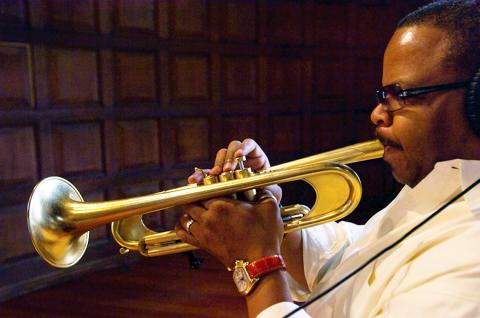The National Concert Hall’s summer jazz season continues with performances tonight and tomorrow from two highly accomplished American artists.
Trumpeter Terence Blanchard and his quintet take to the stage tonight. The New Orleans native entered the scene in the early 1980s, and served stints in the bands of jazz masters Art Blakey and Lionel Hampton.
Blanchard, 49, has since moved on to become one of the most recognized musicians of his generation, with a long list of composer credits and several Grammys.

Photo Ccourtesy of National Theater and Concert Hall
His hard bop style of playing was featured on McCoy Tyner’s Illuminations (2005), which won a Grammy for Best Jazz Instrumental album. Blanchard and his quintet also earned a Best Large Jazz Ensemble Album Grammy for their 2007 album A Tale of God’s Will (A Requiem for Katrina), which included pieces heard in Spike Lee’s 2006 documentary on the aftermath of Hurricane Katrina in New Orleans.
Blanchard, also known as a prolific film composer with more than 50 movie scores under his belt, is a longtime collaborator of Lee’s. He composed the soundtracks for the director’s early 1990s films Jungle Fever and Malcolm X, as well as the 2006 box office hit Inside Man.
For tonight’s show, he will be joined by Brice Winston on saxophone, Fabian Almazan on piano, Joshua Crumbly on bass and Kendrick Scott on drums.

Photo Courtesy of National Theater and Concert Hall
Tomorrow’s concert shifts from Blanchard’s sophisticated, African fusion-influenced bop sound to down-home gospel blues, funk and soul by pianist Ramsey Lewis and his quintet.
Lewis, 76, has a gospel and classical background that has deeply influenced his sound today, a combination of virtuosic piano playing, danceable grooves and soul.
The Chicago native made his initial mark on the jazz world in the 1960s with soul jazz albums such as The In Crowd and the song Hold It Right There, both of which earned him Grammy awards.
He dipped into jazz fusion in the 1970s, switching to electric piano for his hit album Sun Goddess (1974), which reunited him with a former bandmate, singer Maurice White of jazz fusion and disco group Earth, Wind & Fire.
In 2007, Lewis received a Jazz Master Award from the National Endowment for the Arts, the highest official recognition for jazz musicians in the US. He will be joined on stage tomorrow by guitarist Henry Johnson, keyboardist Tim Gant, bassist Joshua Ramos and drummer Charles Heath.
The National Concert Hall’s jazz program concludes on Sept. 9 with a concert by jazz fusion/smooth jazz group Yellowjackets. For more details on the program and artists, visit event.ntch.edu.tw/2011/jazz.

Growing up in a rural, religious community in western Canada, Kyle McCarthy loved hockey, but once he came out at 19, he quit, convinced being openly gay and an active player was untenable. So the 32-year-old says he is “very surprised” by the runaway success of Heated Rivalry, a Canadian-made series about the romance between two closeted gay players in a sport that has historically made gay men feel unwelcome. Ben Baby, the 43-year-old commissioner of the Toronto Gay Hockey Association (TGHA), calls the success of the show — which has catapulted its young lead actors to stardom -- “shocking,” and says

The 2018 nine-in-one local elections were a wild ride that no one saw coming. Entering that year, the Chinese Nationalist Party (KMT) was demoralized and in disarray — and fearing an existential crisis. By the end of the year, the party was riding high and swept most of the country in a landslide, including toppling the Democratic Progressive Party (DPP) in their Kaohsiung stronghold. Could something like that happen again on the DPP side in this year’s nine-in-one elections? The short answer is not exactly; the conditions were very specific. However, it does illustrate how swiftly every assumption early in an

Inside an ordinary-looking townhouse on a narrow road in central Kaohsiung, Tsai A-li (蔡阿李) raised her three children alone for 15 years. As far as the children knew, their father was away working in the US. They were kept in the dark for as long as possible by their mother, for the truth was perhaps too sad and unjust for their young minds to bear. The family home of White Terror victim Ko Chi-hua (柯旗化) is now open to the public. Admission is free and it is just a short walk from the Kaohsiung train station. Walk two blocks south along Jhongshan

Jan. 19 to Jan. 25 In 1933, an all-star team of musicians and lyricists began shaping a new sound. The person who brought them together was Chen Chun-yu (陳君玉), head of Columbia Records’ arts department. Tasked with creating Taiwanese “pop music,” they released hit after hit that year, with Chen contributing lyrics to several of the songs himself. Many figures from that group, including composer Teng Yu-hsien (鄧雨賢), vocalist Chun-chun (純純, Sun-sun in Taiwanese) and lyricist Lee Lin-chiu (李臨秋) remain well-known today, particularly for the famous classic Longing for the Spring Breeze (望春風). Chen, however, is not a name